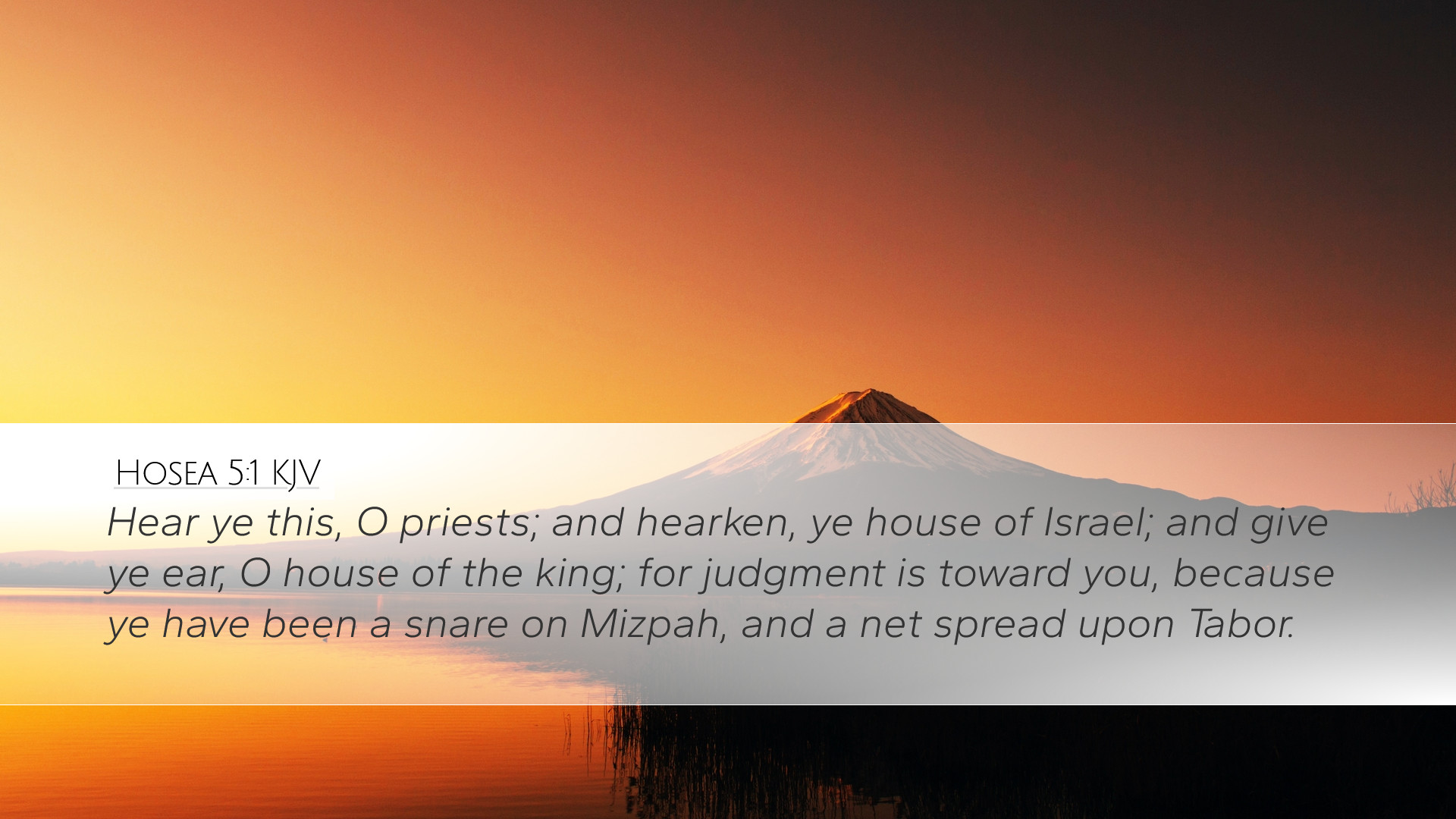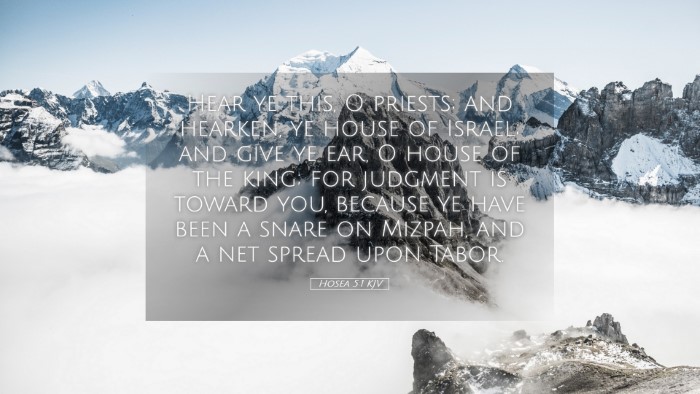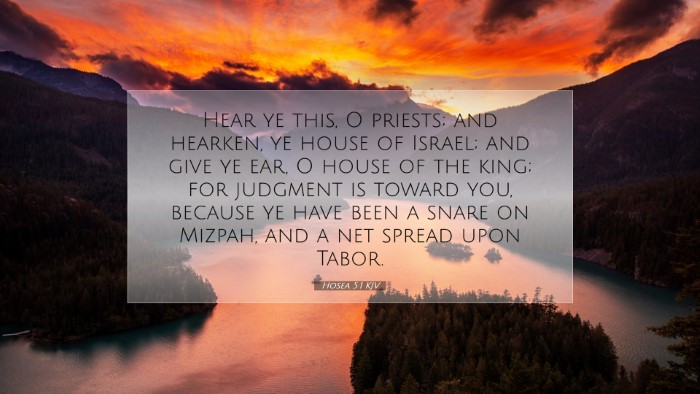Old Testament
Genesis Exodus Leviticus Numbers Deuteronomy Joshua Judges Ruth 1 Samuel 2 Samuel 1 Kings 2 Kings 1 Chronicles 2 Chronicles Ezra Nehemiah Esther Job Psalms Proverbs Ecclesiastes Song of Solomon Isaiah Jeremiah Lamentations Ezekiel Daniel Hosea Joel Amos Obadiah Jonah Micah Nahum Habakkuk Zephaniah Haggai Zechariah MalachiHosea 5:1
Hosea 5:1 KJV
Hear ye this, O priests; and hearken, ye house of Israel; and give ye ear, O house of the king; for judgment is toward you, because ye have been a snare on Mizpah, and a net spread upon Tabor.
Hosea 5:1 Bible Commentary
Bible Commentary on Hosea 5:1
Verse Reference: Hosea 5:1
“Hear this, O priests; and hearken, ye house of Israel; and give ear, O house of the king; for judgment is toward you, because ye have been a snare on Mizpah, and a net spread upon Tabor.”
Introduction
This verse is a powerful summons to the religious and political leaders of Israel, calling them to attention regarding God's impending judgment. Through the prophet Hosea, God addresses the priests, the people of Israel, and the royalty. This multi-faceted addressing demonstrates the comprehensive nature of divine accountability that extends to all segments of society.
Insights from Matthew Henry
Matthew Henry’s commentary emphasizes the urgency in the call to listen. He points out that God requires distinct attention from the authorities of the nation—this is not a message merely for the common folk but for priests and kings, indicating their significant roles in spiritual and national leadership.
-
Priests as Spiritual Leaders:
Henry notes that priests are responsible for guiding the people in righteousness. Their failure has led the nation into sin, implicating them directly in the collective accountability of Israel.
-
The Judgment Approaches:
He warns that judgment is targeting the leaders first due to their influential roles. The phrases “a snare” and “a net” reflect the entrapment they have made of the people, leading them away from the paths of righteousness.
Insights from Albert Barnes
Albert Barnes provides a thorough analysis of the geographical references within the verse. Mizpah and Tabor are locations that held significance in Israel's history—Mizpah being a site of watchfulness and Tabor known for its elevated prominence.
-
Symbolic Locations:
Barnes suggests that these places symbolize the lofty position and the responsibility of the leaders. They are to be watchmen, yet they have instead become instruments of deceit and entrapment for their nation.
-
Call to Responsibility:
Barnes underscores the serious nature of the assembly, indicating that those who are supposed to provide shelter and protection are now a cause of judgment. The emphasis is on their grievous failure to uphold their duties.
Insights from Adam Clarke
Adam Clarke approaches this text by exploring the characteristic style of prophecy in Hosea. He notes that the tone of the word is one of lamentation for the state of the nation and a cry for repentance.
-
Divine Lamentation:
Clarke highlights that the call comes with a sense of sorrow from God over the impending disasters due to Israel's sins. The leaders, who were meant to guide the people toward God, have instead led them astray.
-
Call to Repentance:
Clarke emphasizes the importance of heedfulness as a prerequisite for salvation. The leaders' acknowledgment of their sinfulness is necessary for Israel to turn back to God with a spirit of repentance.
Theological Implications
Hosea 5:1 carries profound theological implications regarding leadership and accountability before God. It illustrates the principle that spiritual leaders are held to a higher standard because their influence can lead the masses toward righteousness or away from it.
-
Leadership Accountability:
The verse serves as a reminder to modern-day leaders—whether in the church or government—that their actions have ramifications that extend beyond themselves. The call to “hear” is not just an admonition but a warning of the serious consequences of neglect and misguidance.
-
Nature of Divine Judgement:
The imagery of “a snare” and “a net” suggests that God is acutely aware of the beguilement stemming from leadership. This highlights a fundamental tenet of biblical theology: God's judgment is both just and restorative, seeking to guide His people back to unity with Him.
Practical Application for Today
As we contemplate this verse, pastors and theologians should consider the implications for their own ministries and leadership roles:
-
Listening to God:
In an age where many voices compete for attention, it is imperative for leaders to prioritize listening to God’s word and remain vigilant against the snares of contemporary culture that may lead them astray.
-
Call to Repentance:
Encouragement towards collective and personal repentance should be fostered in congregations, inviting an openness to God's correction and leading to transformation both individually and as a church body.
Conclusion
Hosea 5:1 serves as a timeless reminder of the responsibilities borne by leaders and the necessity of hearing the call of God amidst the challenges of life. The combination of prophetic warning and profound implications for leadership still echoes within the church today. Each generation is charged with the responsibility to heed God’s word and act toward righteousness to fulfill His divine purposes in the world.


